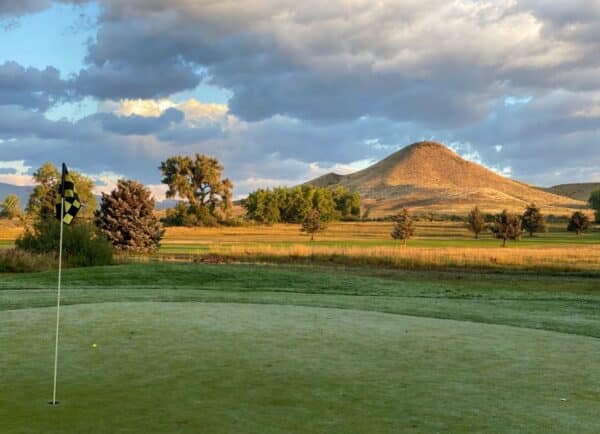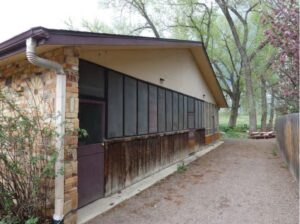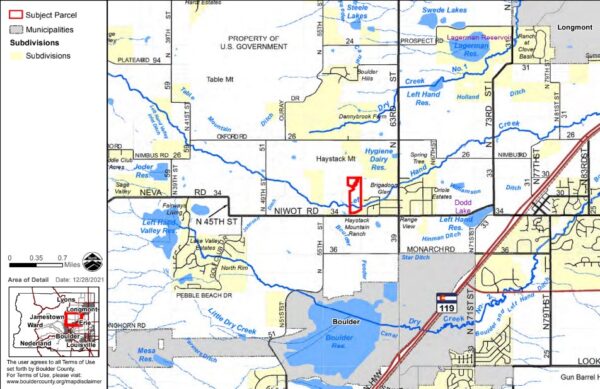A former Arapaho tribal campground that was later a homesteader’s ranch and then a golf course in Boulder County is now the source of a legal dispute over its historical value.
Haystack Ranch sits at the base of Haystack Mountain in the small town of Niwot. After the Haystack Mountain Golf Course closed in 2021, developer Michael Markel purchased its 110 acres for about $6 million, according to the Left Hand Valley Courier.
Markel split Haystack Ranch into three parcels, kept one for himself and listed the others. The easternmost parcel was sold to Anders and Jaclyn Hester, who Markel is now suing.
In his Jan. 31 lawsuit, Markel alleged the Hesters have ignored requirements that were spelled out before they bought the land, namely that they demolish a barn, garage and golf clubhouse there. The Hesters have refused to sign demolition permits, according to Markel.
“We all agreed to what the community was going to look like and now they’re reneging,” the founder of Markel Homes in Boulder said during an interview.
“Even though they signed everything, something tells me they didn’t really believe what they agreed to and now they’re trying to obstruct me in every way possible. I’ve just sort of had it,” Markel said. “I’ve got to protect my community and my property.”
In November, the Hesters asked the Boulder County Historic Preservation Advisory Board to list the barn, garage and clubhouse as historic landmarks. And they may succeed.
Haystack Mountain was once a prime spot for bison spotting and its base served as a Native American campground, according to a preservation application the Hesters filed. The widow of a gold mining homesteader bought the mountain and the ranch in the late 19th century.
After changing hands a few times, it became the nine-hole public golf course in the 1960s and remained that way until the course closed 16 months ago, following its owner’s death.
“The barn, garage, and the Haystack Mountain Golf Course clubhouse located at 5767 Niwot Rd. are important historical structures for their association with Boulder County’s history from the 1800s through October 2021,” the Hesters’ application states.
“The barn (built sometime around/before 1882) and the garage (built sometime around/before 1905) tell the story of early settlers to the Haystack Mountain area,” it notes. “…The golf course’s clubhouse was built in 1974 and encapsulates the history of the course.”
The Hesters have found receptive ears among the staff of the Boulder County Historic Preservation Advisory Board, who recommended the board approve the Hesters’ application over the objections of Markel, who believes the application was filed in bad faith.
“Like virtually every other property on the Front Range, ownership can be traced back to agricultural use in the 1800s,” Hester’s attorney, Craig Blockwick, wrote to the board Dec. 1. “There is no unique historical significance in that original acquisition and use, either in terms of the people involved or events. There is no vestige of those historical antecedents.”
The barn, he said, is an “ordinary agricultural barn in somewhat run-down condition” and “the shed, simply stated, is an ordinary storage structure.” As for the clubhouse, there is “nothing significant in its use or history” and it’s made “of common brick of no particular novelty.”
On Feb. 1, one day before a historic preservation board vote, Boulder County District Court Judge Robert Gunning ordered a temporary restraining order and the board tabled the matter indefinitely. It is not scheduled to be voted on at the board’s March meeting.
Markel is represented in the lawsuit by attorneys Keith Edwards and Matthew Simonsen with the Hutchinson Black & Cook law firm in Boulder.
The Hesters are represented by Jack Storti with Berg Hill Greenleaf Ruscitti in Boulder. He did not respond to requests for comment about the lawsuit.
A former Arapaho tribal campground that was later a homesteader’s ranch and then a golf course in Boulder County is now the source of a legal dispute over its historical value.
Haystack Ranch sits at the base of Haystack Mountain in the small town of Niwot. After the Haystack Mountain Golf Course closed in 2021, developer Michael Markel purchased its 110 acres for about $6 million, according to the Left Hand Valley Courier.
Markel split Haystack Ranch into three parcels, kept one for himself and listed the others. The easternmost parcel was sold to Anders and Jaclyn Hester, who Markel is now suing.
In his Jan. 31 lawsuit, Markel alleged the Hesters have ignored requirements that were spelled out before they bought the land, namely that they demolish a barn, garage and golf clubhouse there. The Hesters have refused to sign demolition permits, according to Markel.
“We all agreed to what the community was going to look like and now they’re reneging,” the founder of Markel Homes in Boulder said during an interview.
“Even though they signed everything, something tells me they didn’t really believe what they agreed to and now they’re trying to obstruct me in every way possible. I’ve just sort of had it,” Markel said. “I’ve got to protect my community and my property.”
In November, the Hesters asked the Boulder County Historic Preservation Advisory Board to list the barn, garage and clubhouse as historic landmarks. And they may succeed.
Haystack Mountain was once a prime spot for bison spotting and its base served as a Native American campground, according to a preservation application the Hesters filed. The widow of a gold mining homesteader bought the mountain and the ranch in the late 19th century.
After changing hands a few times, it became the nine-hole public golf course in the 1960s and remained that way until the course closed 16 months ago, following its owner’s death.
“The barn, garage, and the Haystack Mountain Golf Course clubhouse located at 5767 Niwot Rd. are important historical structures for their association with Boulder County’s history from the 1800s through October 2021,” the Hesters’ application states.
“The barn (built sometime around/before 1882) and the garage (built sometime around/before 1905) tell the story of early settlers to the Haystack Mountain area,” it notes. “…The golf course’s clubhouse was built in 1974 and encapsulates the history of the course.”
The Hesters have found receptive ears among the staff of the Boulder County Historic Preservation Advisory Board, who recommended the board approve the Hesters’ application over the objections of Markel, who believes the application was filed in bad faith.
“Like virtually every other property on the Front Range, ownership can be traced back to agricultural use in the 1800s,” Hester’s attorney, Craig Blockwick, wrote to the board Dec. 1. “There is no unique historical significance in that original acquisition and use, either in terms of the people involved or events. There is no vestige of those historical antecedents.”
The barn, he said, is an “ordinary agricultural barn in somewhat run-down condition” and “the shed, simply stated, is an ordinary storage structure.” As for the clubhouse, there is “nothing significant in its use or history” and it’s made “of common brick of no particular novelty.”
On Feb. 1, one day before a historic preservation board vote, Boulder County District Court Judge Robert Gunning ordered a temporary restraining order and the board tabled the matter indefinitely. It is not scheduled to be voted on at the board’s March meeting.
Markel is represented in the lawsuit by attorneys Keith Edwards and Matthew Simonsen with the Hutchinson Black & Cook law firm in Boulder.
The Hesters are represented by Jack Storti with Berg Hill Greenleaf Ruscitti in Boulder. He did not respond to requests for comment about the lawsuit.



